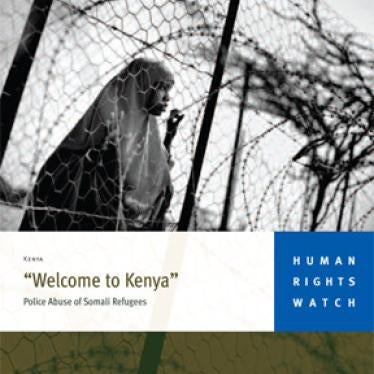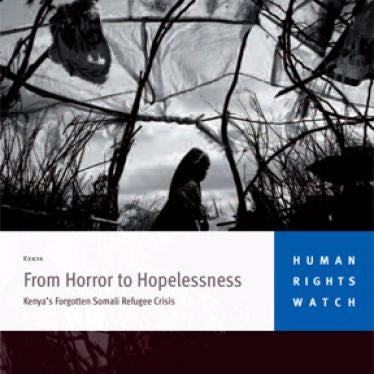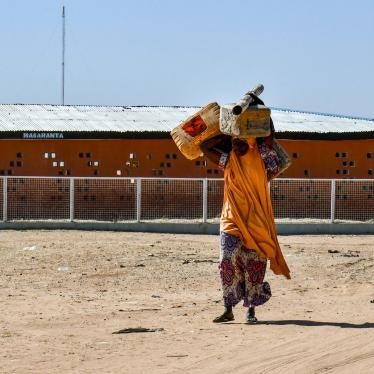(Nairobi) - The Kenyan government should immediately stop deporting Somali nationals to war-torn Somalia and make a public commitment to protect and help them, Human Rights Watch said today. The Kenyan authorities deported almost 300 Somalis to south-central Somalia on November 15, 29, and 30, 2010, in violation of international law.
Credible sources and witnesses to the deportations on November 29 and 30 told Human Rights Watch that police in the Kenyan border town of Liboi used pickup trucks to drive 130 Somali asylum seekers back to the Somali border. On November 15, Kenya also deported from Liboi 140 Somalis who had been serving prison sentences in Mombasa for unlawful presence in Kenya. The vast majority of Somalis seeking asylum in Kenya pass through Liboi.
"Kenyan officials are flagrantly violating Somalis' right not to be returned to a place where their lives are at grave risk," said Gerry Simpson, senior refugee researcher for Human Rights Watch. "The Kenyan government needs to send a clear message to provincial and local authorities that Somalis must not be deported to their war-torn country."
The 130 asylum seekers who were returned on November 29 and 30 had arrived in Liboi during the week of November 22. They were unable to continue to the nearby Dadaab refugee camps -which shelter almost 300,000 refugees - in part because there were no vehicles to take them there. The United Nations refugee agency (UNHCR) has given the Kenyan Department of Refugee Affairs (DRA) one truck to help drive asylum seekers from Liboi to the camps, but for reasons that remain unclear, the truck was unavailable.
A day or two before the November 29 deportations, the district commissioner responsible for Kenya's Lagdera District, which includes Liboi and the Dadaab camps, traveled to Liboi to meet with security officials and gave the go-ahead for the deportations.
In June, Human Rights Watch reported that during 2009 and the first half of 2010, Kenya regularly returned dozens of Somali asylum seekers - most of them women and children - to south-central Somalia. Somalia is currently in the throes of one of its worst crises in nearly 20 years of conflict, and the human rights situation is critical. Continuous fighting between militant Islamist groups and the Transitional Federal Government rages in Somalia's capital, Mogadishu, with all parties contributing to indiscriminate attacks on civilians.
International and African regional law prohibit the forcible return of refugees and asylum seekers to persecution, torture, and situations of generalized violence that seriously disturb public order. UNHCR advises governments not to return Somali civilians to south-central Somalia because of the "risk of serious harm" that civilians may face there due to widespread violations of the laws of war and large-scale human rights violations.
Although the Kenyan government may lawfully prevent those reasonably regarded as a threat to its national security from entering Kenya, it may not close its borders to asylum seekers and is obligated to screen them for refugee status before determining whether to return them.
The 140 Somalis deported in mid-November were transported on two buses from Mombasa to Liboi on November 14 and 15, passing through Dadaab on November 15. That evening, all the deportees were driven from Liboi to the border. Authorities in Liboi confirmed that the Somalis had been deported on November 15 based on deportation orders.
In addition to the restrictions on deportation under international and regional law, Kenyan law provides that any non-Kenyan in Kenya has the right not to be returned to a place where his or her "life, physical integrity, or liberty would be threatened on account of external aggression, occupation, foreign domination, or events seriously disturbing public order," and provides that such a person shall automatically be deemed to be a refugee ("prima facie refugee").
Somalis registering in Dadaab with UNHCR and, to an unknown extent, Somalis registering with the DRA in Nairobi are automatically granted status in Kenya on this prima facie basis. If an individual fails to register within 30 days, Kenyan law allows the authorities to prosecute him or her for unlawful presence in Kenya.
"International law, Kenyan law, and the UN refugee agency all agree that no one should be returned to south-central Somalia, and yet Kenyan officials ignore all three," Simpson said. "Kenya should uphold the basic right of all people fleeing violence and persecution to seek and to get protection in Kenya."








